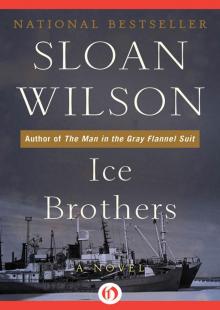- Home
- Sloan Wilson
A Summer Place Page 24
A Summer Place Read online
Page 24
Poor Helen delayed the burial of Margaret; she hated to see her go, she said. For three days the old lady lay in state in the undertaker’s parlor, while the family took turns standing watch over her. The purpose of this was to allow all her friends to pay their final respects, and counting the membership of the entire D.A.R., quite a few came. Much of the time, however, no one was in the small room where the casket lay, and Molly found it disturbing to sit there on a straight-backed chair waiting for callers.
Finally Margaret was laid to rest in the cemetery and a high marble tower representing the aspirations of humanity or something similar was placed over her. It was far taller than any of the other tombstones nearby, thus achieving for Margaret a final victory over her neighbors.
Helen went into deep mourning and so did Molly, of course. Helen had everything but their underwear dyed black. It had never really seemed possible to Helen that her mother would die, and now she was gone, abject fear came as well as relief. She looked closely at Bruce, and saw that he didn’t look well. At seventy-three, there was a pallor upon him; he was still pear-shaped, but he appeared to be gradually deflating, like a balloon with a slow leak. Soon he would die, Helen thought, and some day Molly would get married, and then she would be alone. Never in her life had Helen been alone. Her mother had had sitters for her up till the time she got married because “a young girl should not be left alone in the house.” The prospect of living alone in the big house Ken had bought for her parents terrified Helen, and the vast amount of crying she did that week was not only for her dead mother. Tearfully she made Molly promise that if she ever got married she would allow her to live with her. Helen considered having Molly drop out of Briarwood instead of returning, but she had only three months to go before graduating, and no one in Helen’s block had ever graduated from such a place before.
On March 15, Molly returned to her school. She was so numbed that she found it difficult to think of spending her spring vacation with her father and with John. Two whole weeks with John would determine whether he really liked her or not, she thought, and with panic pictured herself trying to talk steadily the entire time. That would be the end of the relationship, she suspected, and soon there would not even be his letters to look forward to. Overcome by exhaustion, Molly felt almost constantly as though she were about to cry.
Chapter Twenty-Five
HELEN WAS TERRIFIED by the thought of Molly spending two weeks with Ken. For a long while Helen had been exaggerating all of Ken’s faults, real and imagined, and he came back to her in memory as an ogre, a beast. He was, after all, an admitted adulterer, and although she tried not to think about it, Helen rather imagined that he and that woman he had married lay around all day doing nothing but make love. As if it weren’t bad enough to send a pure young girl into an atmosphere like that, there was the appalling fact that that woman had a son who would probably be there too, under the very same roof with Molly, and heaven knew what that woman and Ken would let the young people do, or even encourage. Helen’s mind boggled at the possibilities her imagination conjured up. What she couldn’t understand was why the law actually permitted Molly to visit her father, even after all the facts had been examined by the court. More than that, the judge insisted that Molly be allowed to stay with her father a month a year if she wished, and Helen’s lawyer told her that if she tried to block it, Ken might stop his alimony payments. Helen felt almost as though all the policemen in the world were descending upon her with legal decrees forcing her to commit her innocent daughter to a brothel.
As the time for the visit grew close, Helen couldn’t sleep. Old Bruce, her aging father, coughed a lot, and as she lay awake at night listening to him, she half hoped he would get so sick that Molly would have to come home again and be a nurse. Certainly the court couldn’t object to the dear girl coming home in an emergency, with her grandfather sick, dying, perhaps, of a broken heart caused by the death of his beloved wife.
While waiting to go to Florida, Sylvia had a premonition that something would prevent the visit, or that if not, it would somehow turn out disastrously. She had a clear feeling that her punishment was not completed yet, that she would not be absolved of her sins until something terrible occurred. There was a temptation for her to go around apologizing to everyone in an attempt to ward off the blow. At midnight she once wrote Bart a long letter telling him she was sorry she had married him without loving him and that she realized now that many of the troubles they had had were her own fault. The next morning she tore it up, but she couldn’t tear the recurrent apologies from her mind. One of her nightmares was of John and Molly drowning together while in Florida. They would go off in a boat, the way they had long ago as children, only this time they would never come back. From this dream Sylvia woke up crying. It took Ken a long while to soothe her, and he was shocked when she admitted that she half hoped the children wouldn’t come for Easter vacation, because she feared for them so.
Early in March Ken and Sylvia left the small farm they had bought in Connecticut and opened their house in Florida. Driving past the old motel Ken had bought for her, Sylvia averted her eyes, and she was glad he had decided to sell it. The place was closed now, and looked somehow sinister. Remembering some obviously unmarried couples who had come there while she was manager, Sylvia felt as though she had been the keeper of a bawdy house, and this increased her forebodings of disaster.
Despite her premonitions, Sylvia worked hard to prepare for the coming of the children. A week before they were to arrive, Molly’s room upstairs and John’s downstairs were spotlessly clean, with new blankets and counterpanes on the beds, and new curtains at the windows. The visit should be a fresh start for everyone, Sylvia told herself, and it seemed suitable to renew everything: the rugs on the floor, the towels, the linen. Molly was expected to arrive on April 3, with John coming four days later when his vacation started. From the twenty-fifth of March on, Sylvia worked in the kitchen, helping the cook to prepare a feast to be stored in the deep freezer. She made eight cherry pies, which had always been John’s favorite, and a dozen chocolate layer cakes, which Ken said Molly liked, and she bought ducks, great roasts of beef, thick steaks—enough food, Ken said smilingly, to last them all a year.
Sylvia also laid in stores of Coca Cola and ginger ale before reflecting that after all, John had just turned eighteen, and Molly was seventeen: perhaps they’d rather have beer, or stronger fare. This thought bothered her, and she asked Ken whether he thought they ought to serve the children liquor. “If they ask for it,” he said. “I don’t think I’d volunteer it. We’ll just have to play this thing by ear.”
On the day before Molly was expected, Sylvia made arrangements to have flowers delivered for almost every room in the house. She ordered calla lilies, roses and spring blossoms of all descriptions. When Ken smilingly said, “Whom are you planning to bury?” she whirled on him and replied, “Don’t say that! Please! Knock on wood!”
During the last days of their waiting Sylvia worried a lot about whether a real reconciliation with their children could be achieved, or whether this was going to turn out to be just a frozen courtesy visit. In the back of Sylvia’s mind was the dread that Todd Hasper had talked to John; no, it was more than a dread, it was a certainty, it was logical, taking into account the kind of man Hasper was. At night when she thought of this she covered her face with her hands, the gesture now becoming habitual; she often went to sleep that way. I have to remember that even youngsters are merciful, she thought; at least I have to pray for that. How strange that she could never even imagine talking to John about the things Hasper probably had told him. Such matters could not be talked about by a mother and son; the understanding and the forgiveness, if there were to be any, could not spring from explanation, and after all, Sylvia thought, even if she could discuss such matters, what was there to be said?
She worried about Ken’s meeting Molly almost as much as her own reconciliation with John. The big man was like a child looking for
ward to Christmas, she thought; he seemed to assume his daughter would come running immediately to his arms, that their separation had been merely geographical.
“You don’t want to get your hopes up,” she said to him. “You might be in for a disappointment.”
“Why do you say that?”
“I don’t know. I have a feeling…”
Her heart jumped when the telephone rang at eleven o’clock on the evening of March 30, and before she picked up the receiver she knew something had gone wrong, that the visit was imperiled. She was not surprised when the operator said there was a long-distance call from Buffalo for Mr. Kenneth Jorgenson, but the look on his face when he picked up the receiver was odd. “Hello?” Ken said, “Who is it?” That was the first time Sylvia had ever heard that deep voice sound frightened.
“It’s me!” Helen said, her voice shrill with fear at her own daring, her own sudden midnight decision.
“Helen! What’s the matter?”
“It’s Dad! Poor Dad.”
“Is he dead?”
“No, but he’s so sick, and I’m afraid Molly won’t be able to go South. We need her here.”
“Now look!” Ken said, his deep voice suddenly rumbling louder, sounding as though it could easily carry to Buffalo without the aid of a telephone. “Don’t try to pull that!”
“Why, I don’t know what you mean! He’s got bronchitis, and a terrible cough, and the doctor said, a man his age…”
“Get a nurse.”
“Why, he might die when she was away, and she’d never forgive herself.”
There was a pause while Ken clenched and unclenched his free hand. “What’s his temperature?” he said suddenly. “The truth now, because I’m going to call his doctor.”
“It’s not the temperature, it’s his poor lungs, at his age…”
“Helen, you listen here! You stop this foolishness and let Molly come down here, or I’ll cause you more trouble than you’ve ever dreamed of. You won’t get another cent out of me until this thing is straightened out. I’ll get every lawyer in New York on your tail.”
“It’s an emergency…” Helen said weakly.
“You better have a doctor’s sworn testimony to prove it!”
“Molly could come some other time…”
“I want her here now.”
“She doesn’t really want to come. I can’t force the child.”
“Is she there?”
“No. She’s at school. I just talked to her.”
“I’ll call her myself in the morning.”
Ken slept hardly at all that night. At ten the next morning he telephoned Briarwood Manor. It took a long while to get Molly to the phone.
“Hello?” Molly said suddenly, her voice sounding timid and far away.
“Molly, baby, I’m going to be terribly disappointed if you can’t get down here for your vacation,” Ken said, and the note of pleading in his voice shocked Sylvia. If Molly doesn’t come, I bet John won’t, she thought—he’s really coming to see her, not us. There would be no visit after all, Sylvia thought as she listened to Ken’s sad voice, and she was caught in a collision of disappointment and relief.
“Do you want to come?” Ken kept saying to Molly. “Do you want to?” There was a silence before he said, “Don’t cry! Don’t cry! Oh, please come down here! We need each other!”
There was a pause before he put the receiver down. His face was glistening with sweat when he said, “She is coming.”
Sylvia said nothing. The fear was churning in her again that it would be better, far better, if everything were postponed. You shouldn’t have begged her, she wanted to say, but that would have hurt him too much. The rest of the day Sylvia hoped for the telephone to ring again, but it didn’t.
Molly’s plane was due at five the next afternoon. Carla had not seemed overjoyed at the prospect of “a new big sister” arriving and went off to spend the day with friends. Ken insisted on leaving the house at four, although it was only a ten-minute drive to the airport. Sometimes the planes got in early, he said, especially with a tail wind, and anybody could see that the wind was blowing hard from the north. In the waiting room, he paced back and forth restlessly, dressed in his best linen suit, with his handkerchief neatly folded in his breast pocket, and a new necktie of the pale blue Molly liked. Sylvia sat with her hands folded in her lap, bent over like a nun in church. When the plane was announced, she had to run to keep up with Ken as he strode to the gate. Behind a rope barrier he stood in the midst of a knot of people, watching intently as the door of the plane was opened. The stairway on wheels was rolled up, and out stepped a girl, but it was the stewardess. Next there was a fat man with a briefcase, and a woman holding a child. A seemingly endless procession of people came out; one would never have thought the plane could hold so many. Last of all came Molly.
“There she is!” Ken shouted, a deep bellow that carried all the way to the plane, and bursting from the knot of people, he vaulted the rope barrier, and ran toward her. She stood on the platform high up, by the plane door, a slender girl in a blue coat with the wind whipping the skirts about her legs, holding her hat on her head with one hand, and she looked confused as that enormous man ran toward her, came bounding up the steps, and crushed her in his arms. Oh no, he shouldn’t have done that, Sylvia thought; these things have to go slow and easy, but it was too late to say that. Ken came toward her, so wrapped up in his own joy at seeing his daughter that he didn’t notice the strained look on Molly’s face, the frightened, puzzled eyes. “Here she is!” he said jubilantly to Sylvia. “Hasn’t she grown up to be beautiful?”
“Hello, dear,” Sylvia said in a low voice, and held out her hand, because she was suddenly afraid Molly would flinch if she kissed her. My God, maybe she knows all about me too, Sylvia thought with horror, and was about to let her hand drop when Molly clasped it shyly, and said, “Hello…” Molly stopped suddenly, because she had almost added “Mrs. Hunter,” and she couldn’t say “Mrs. Jorgenson,” and certainly not “Mother,” and “Sylvia” sounded wrong too, as though she were trying to get chummy with her or something. The three of them walked to the car, and Ken drove them home, talking enthusiastically about all the wonderful things they were going to do, now they were all getting together again.
“John is coming Thursday,” Ken said, his voice a little roguish.
“That’s nice,” Molly replied, attempting a casual tone of politeness, but sounding completely uninterested instead.
Ken glanced at her sharply, and for the first time noticed how pale she was, how tense. “Are you feeling all right, honey?” he asked.
“Yes,” she said.
When they went into the living room, Molly stood in front of a mirror by a vase of calla lilies and slowly took off her hat. “If you’ll excuse me, I think I’d like to take a little rest before dinner,” she said in her gentle voice. “The plane ride was a little rough.”
“Of course!” Ken and Sylvia said in unison.
After she had gone upstairs, Ken strode restlessly back and forth in the living room. “It’s perfectly natural for her to be shy at first,” he said. “Let’s have a cocktail, Sylvia—I feel like one tonight.”
Sylvia stirred up some Martinis. When Molly came down she glanced at the pitcher on the table and said, “Do you mind if I have one?”
“Sure,” Ken said. He got up and poured it. As Molly took the glass he noticed that there was a barely perceptible nervous tremor in her hand. “It’s good to have you home again!” he said too heartily. “You don’t know how I’ve been looking forward to this!”
Molly took a sip of the Martini and put the glass down. “Thank you,” she replied, obviously trying her best to respond. Turning to Sylvia, she smiled and mechanically said, “I also want to thank you for the beautiful flowers in my room.”
“That’s all right, dear,” Sylvia replied, and reaching for the pitcher of Martinis, was shocked at a sudden urge she felt to
get drunk. Without pouring herself a drink, she put the pitcher down. “I think it’s about time for dinner to be served,” she said.
At breakfast on the morning of the day John was to arrive, Molly said she was going to take a long walk on the beach, looking for shells down by the inlet. She asked Ken not to wait for her if she wasn’t back in time to go to the airport.
“Try to make it,” Ken said, sounding puzzled. “I think poor John would be hurt if you weren’t there. You used to be such good friends.”
“I’ll try,” Molly said, but there was that in her tone which forbade urging, a note of dignity more than shyness. As soon as she had finished her coffee, she changed into her bathing suit, and putting on a beach coat to protect herself from the sun, she set out, walking slowly, with her head bent down, but not looking for shells. It was necessary to forget the pages of poetry she had sent him, she told herself. Probably he had forgotten it himself, and anyway, it wasn’t really important whether he liked her or not; she could survive. It was silly to depend so much on his letters anyway.
Houses had been built all along the row of dunes since Molly had been in Florida, but she was too preoccupied to see them. Children ran past her throwing sand. A hairy man in swimming trunks whistled at her as she walked by, but she didn’t hear him. Instinctively her feet took her north, where there was privacy, for when the hurricanes came bursting through there in the fall, the seas raged high on the beach on both sides of the inlet, and the marching rows of houses stopped cautiously a quarter mile away. Climbing to the crest of the dunes nearest the inlet, she sat with a piece of salty grass between her lips, and stared out to sea.
An hour before John’s plane was due, Sylvia changed into her best white dress and combed her hair. Glancing into the mirror, she saw that insomnia and the strain of the past few days had made her appear haggard. Well, she thought grimly, if Hasper has talked to him, I look the part. One little drink before going to the airport wouldn’t hurt, she thought, and took two.

 A Summer Place
A Summer Place Pacific Interlude
Pacific Interlude Man in the Gray Flannel Suit
Man in the Gray Flannel Suit Ice Brothers
Ice Brothers